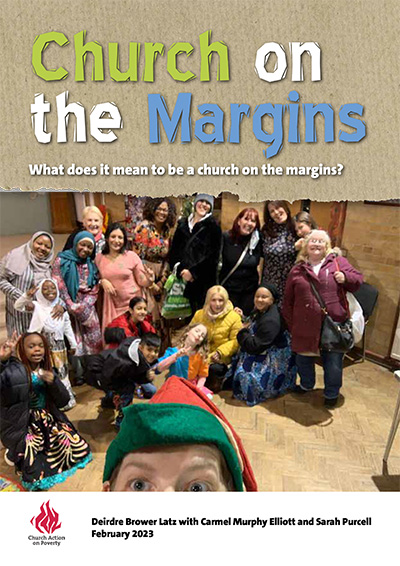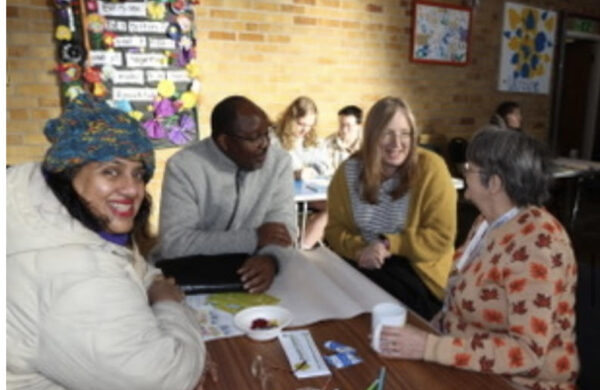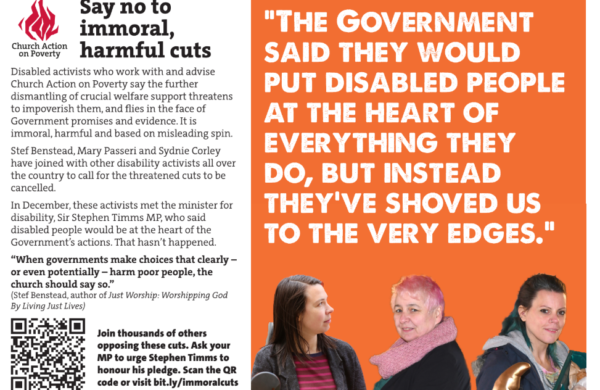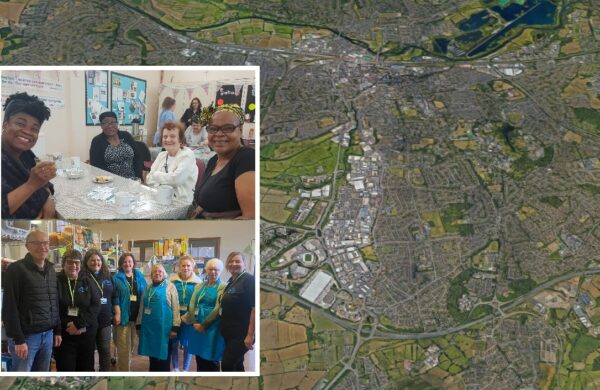What does it mean to be a church on the margins?
In this excerpt from our new report, Deirdre Brower Latz shares some of what she learned in three years talking to churches in communities pushed to the 'margins' in Greater Manchester.

Poverty and marginalisation are a reality in the UK for millions of households. In rural and urban spaces, people without enough food to eat, money to live on, experience social exclusion and negative perception and this reality is worsening. Where is the church and where should it be? According to our research, the place of mainline denominations in proximity or immersed in communities in need has declined over the last decade.
The church’s presence may have declined, or may be patchy; economic hardship, though, is a reality for many. In the UK, poverty is acute and the poverty gap growing and poverty increasing, globally nations slide towards levels of poverty that even recently would have been considered impossible. People with lived experience of poverty are ‘marginalized from effective participation in mainstream economic, social and political life and concentrated into “settlements of the marginal, the socially problematic and welfare-dependent.”’’ This is a scandal – dehumanising people who experience economic (or other) marginalisation and poverty, assumptions about their value, worth and purpose are all too common, even in the church.
People’s stories and lives are frequently measured through economic engagement, which is a distorted view of humankind. The church’s theological life and imagination has something else to say, which should and could offer vision and a new imagination. There need to be reinvigorated understandings of the intrinsic value of all people, and their stories as alive with good meaning and purpose – significant in the world regardless of economic impact. The question and challenge presented by Pope Francis (one could argue building on Jesus!) and later reframed by Niall Cooper, Director of Church Action on Poverty, is this:
“Do we really believe that God can be found at the margins; do we really believe in a countercultural church of and for the poor; are we prepared to let go of our own power?”
Responses to poverty and people living in communities of poverty are varied and often appear to be poles apart. Social action or social justice; evangelistic responses or community development; unhelpful dichotomies form. In places, the church has separated acts of service and acts of worship, or has left communities, or has remained with congregations who now drive in as commuters to a congregation’s building, once dwellers, now consumers of space. At times, the church has remained present or has reinvested, resourcing new ways of being-in communities identified as in acute need. Some responses to marginal communities are top-down, either mandated denominationally, based on quantitative and normative hard data, or based on qualitative and descriptive narrated research. Often led by a sincere passion for caring for people in poverty, and a sincere hope that the people of estates or marginal communities would once again populate churches. Some church organisations have sought to save communities through immersive engagement in them, operating as benevolent examples of a better way. Some have moved out entirely to areas where middle-class values and church-life have currency as interchangeable.
Poverty and marginality are challenging for the church, no matter the theological persuasion.
In the church, as in the country, poverty is normally perceived from the standpoint of those who are not poor. Tracing its roots through attitudes created in feudal and parish systems, attitudes to poverty emerge in contemporary society as somehow less-than, a shame, a curse, merited or deserved. In a capitalist world, poverty ‘draws its meaning primarily from the plight of a flawed consumer.’ The church is influenced by cultural attitudes, and pathologised approaches towards poor people, pejorative judgements, or patronising approaches can all be seen in and amongst the church.
It’s too easy to speak of ‘the poor’ as a category – poverty is heterogeneous, with differing causes, responses and realities.
What might it mean to have a nuanced view of poverty and marginality? How might the church hear from those often voiceless or scapegoats? How can the church be amongst, for, with, in and of the poorer people, places and communities of the UK? How can the church resist easy answers and singular responses? How can the church respond to the question and challenge: who speaks for people with lived experiences of poverty? In fact, how, when, where and in what way do people speak on their own behalf? Bearing witness to how people themselves navigate poverty and marginality in all its complexities. Since “[p]eople in poverty may thus constitute a serial collectivity, without necessarily having anything in common other than their poverty and societal reactions to it”, how does the church align itself with communities of economic poverty, marginality and do so intent on instilling dignity, listening to the voice of those speaking on their own behalf, from their own lives, telling power how church that honours them could, should and must be, navigating inclusion and belonging as integral to church in and for the margins? What might a church on the margins be?
These questions have been addressed over years by Church Action on Poverty, described as ‘a national ecumenical Christian social justice charity, committed to tackling poverty in the UK’, the organisation ‘work[s] in partnership with churches and with people in poverty themselves to find solutions to poverty, locally, nationally and globally.’ Preoccupied with navigating the church and poverty over decades, more recently alongside policy activism and partnership with research projects, Church Action on Poverty began to explore how to address this very challenge and the Church on the Margins (COTM) project was conceived. The reports from the project summarise the concept, method, process, encounters and tentative conclusions drawn by the researcher facilitator-team over the last three years. We describe the purposes, explore the challenges, name the encounters, offer the method up for scrutiny, and hear from the voices of people from marginalised communities who are vibrant participants in the life of the church. Their voices frame every conclusion and springboard into further discussion. Above all, we tried not to hide from the challenges we faced and faced by the people who courageously shared their stories with us.
Throughout our research we were clear that we would respect all we were told. Our use of stories shared with us was understood as a gift to be honoured. The hope of all those who participated in the research by openly describing their experiences relative to the church was that their voices could potentially change the church itself.




Comments (01)
Comments are closed.